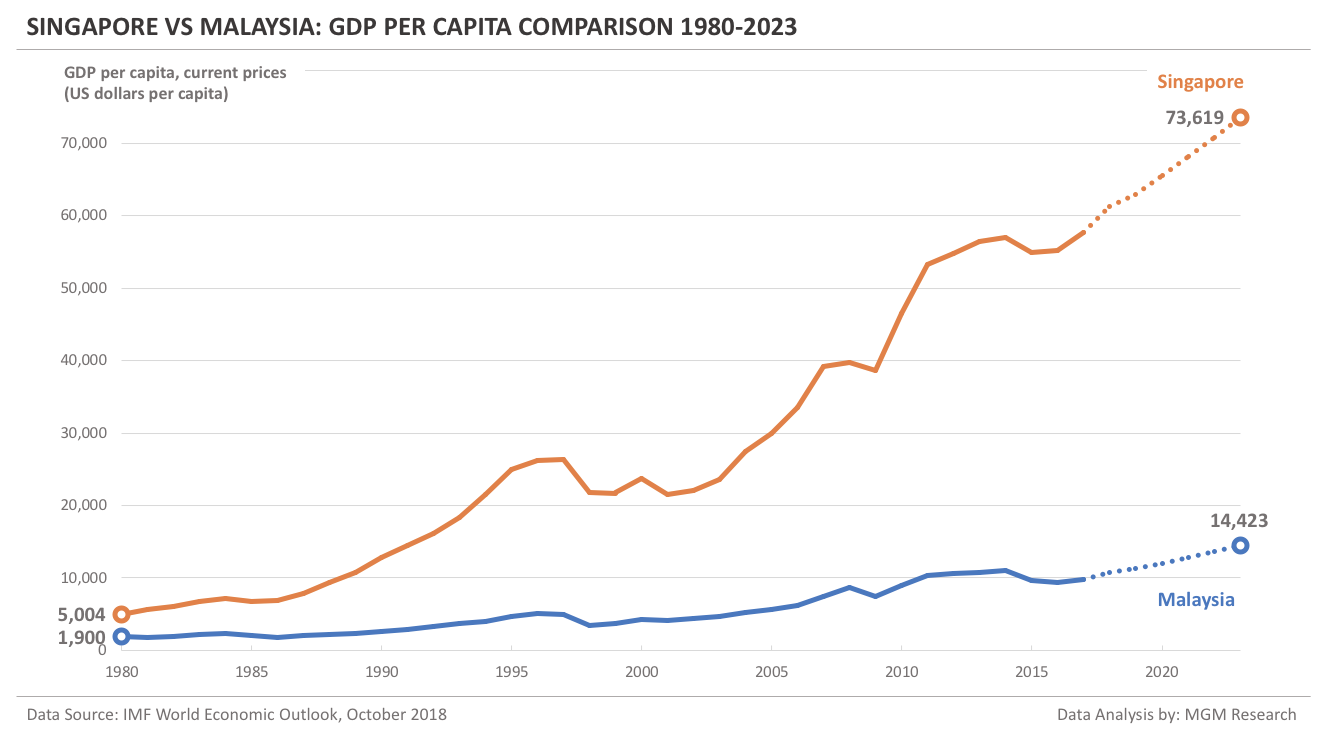Whenever I think that Malaysian politicians have, perhaps, concluded their barrage of ludicrous assaults against their most valuable neighbour, they reignite controversy with another thoughtless comment - with the main culprit often being the prime minister himself.
Millions of people on both sides of the border must have been rather startled when he bemoaned not only the low prices of water that Singapore draws from Johor (no news here) but went on to suggest that the resource-poor city-state has become rich thanks to them.
The question of "why, then, isn't Malaysia rich, since it has all this water for free?" - doesn't seem to have entered his mind.
So why isn't it, after all?
Malaysia keeps making a profit
Regardless of what Mahathir wants to suggest, both deals have always been profitable for Malaysia since Singapore keeps paying for water that would otherwise be discharged into the sea. The city-state also built, maintained and later relinquished control over water facilities in Johor, providing infrastructure for its own and Malaysian use.
On top of that, it also provides a significant discount on treated water delivered to Johor, which is later sold at substantial profit to Malaysian users.
In other words - Malaysia keeps making money on a resource that incurs no costs - and does so largely thanks to Singapore.
Thus, it's rather surprising that Dr. M wants to portray his country as being at a loss. The double irony is, of course, the fact that he himself had two opportunities to renegotiate the terms of the deal - back in 1987 and in 2000 when Singapore already agreed to an increase in price from 3 sen to 45 sen for 1,000 gallons.
So not only isn't Malaysia losing anything, as the deals provide a consistent profit, but Dr. M himself rejected proposals that would have raised the price substantially and extended the deals for another century.
As it is, the remaining one expires in 2061, after which Malaysia will receive nothing, while water from the Johor River is going to continue to flow into the sea. Well done. That's the Malaysian "dog in the manger" style of doing business.
However, this both erratic and rather hostile behaviour guides us neatly to the explanation behind Singapore's success and Malaysian failures to keep up with it.
Why Singapore is rich and Malaysia is poor
Trust.
It is the one thing that makes all the difference.
In virtually every possible way, Malaysia is better positioned to be wealthier than Singapore. It has a much bigger population, it has plenty of natural resources (including oil), a lot of land, several harbors along the Straits of Malacca and shared ties to the UK by being a part of the Commonwealth as well.
And yet, after half a century, its GDP per capita is nearly 6 times smaller than Singapore's.
The reason the little island is so prosperous lies in its ability to attract foreign investment and trade - and it has achieved it by operating in a stable, meritocratic way, free from racial discrimination, having defeated corruption and crime, keeping bureaucracy in check and offering favorable tax environment along with a predictable, simple and swift rule of law.
Meanwhile, in Malaysia, corruption remains rife - from street police to the highest offices of power, with the massive 1MDB scandal still casting a shadow over local politics. It stems from bureaucracy, nepotism, poor organization and substantial racial tribalism.
The resulting domino effect impacts everything else, leading to terrible urban planning, woeful infrastructural underinvestment and widespread crime. Race-based policies, which alienate a third of the country's society, are just a cherry on top of this rotten cake.
Even Malaysians can't really trust their own country so why would foreign investors if they can choose a far safer place for their money just across the border?
The bad doctor
Interestingly, unlike in the West, where politicians in charge often change, both countries have enjoyed decades of political stability with a single party at the helm.
However, while Singaporean PAP kept investing in critical infrastructure (including the world-leading harbour and airport), public transportation, education and healthcare, Malaysian leaders have been distracted by cronyism, often involving grandiose multi-billion ringgit developments like the new administrative capital in Putrajaya or the neighbouring Cyberjaya which was supposed to be Malaysian Silicon Valley.
Both of them, along with ludicrous national car project, giving birth to mediocre Proton and Perodua, are brain children of none other than Dr. Mahathir Mohamad.
The Great Divergence
He had been the person in charge of the country for over 20 years, during the period of rapid technological progress of the 80s and 90s, relinquishing power only in the early 2000s.
Coincidentally, it was the time when the gap between Singapore and Malaysia widened rapidly:

Despite this uninspiring track record, he has not changed his ways upon returning to premiership but rather embraced the old habits of Singapore-bashing - and decided to go even further.
Within less than a year, a chain of incidents, beyond the quarrels over water or borders, eroded Malaysian international standing even more - like the ban on Israeli sportsmen, which ended with Malaysia being stripped of the organization of Paralympic World Championships in 2019, suspension of the East Coast Rail Link, High-Speed Rail or the badly needed MRT expansion in Kuala Lumpur (while another national car is reportedly in development).
None of these really inspire trust but rather murmured laughs of disbelief - further amplified by the baffling announcement of Malaysian Minister of Entrepreneur Development that the country is planning to launch a... flying car.
Instead of trying to bring Malaysia into the fold of civilized, respectable countries Mahathir's moves inspire either condemnation or mockery, making the disgraced, corrupt Najib look like a world-class statesman in comparison.
Malaysia of 2019 is a country which breaches contracts, invades foreign territories, discriminates both foreigners and many of its own citizens, jails people under antiquated religious laws, while failing to address the basic issues of crime, pollution, public transportation and badly needed national infrastructural investment, which has effectively ground to a halt.
In the meanwhile, its leaders - at least several with questionable or outright fake degrees - indulge in delusional ideas of flying cars.
How many potential foreign partners are going to be interested in dealing with a country walking back on contractual commitments, employing frauds as its ministers and tarnishing relations with its globally respected neighbour?
Before you can become wealthy, you have to be trustworthy. So, perhaps Dr Mahahtir should direct his scorn away from Singapore - which dutifully fulfils its obligations - and focus it on his own team.
And himself.





